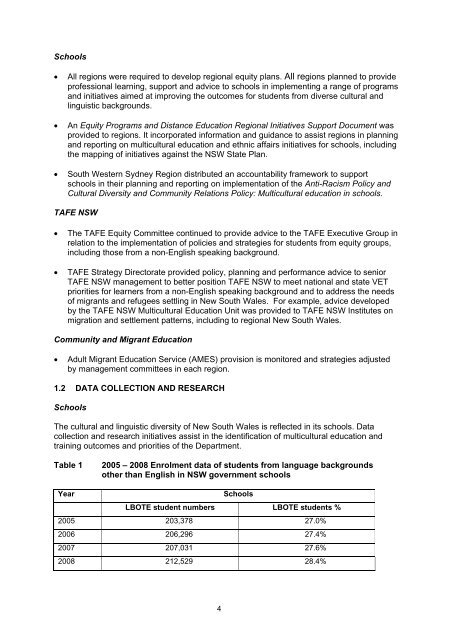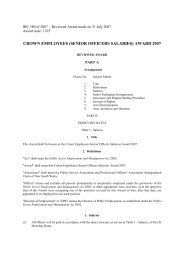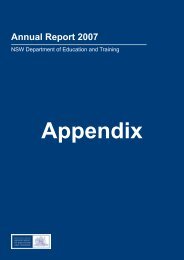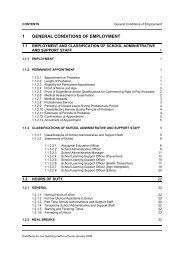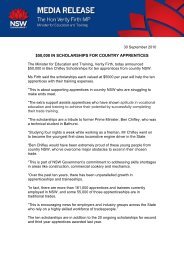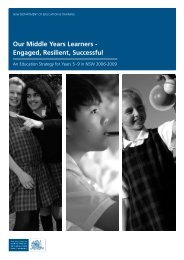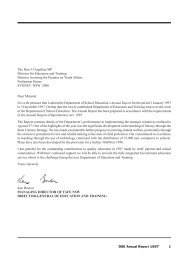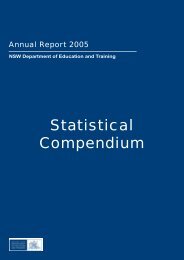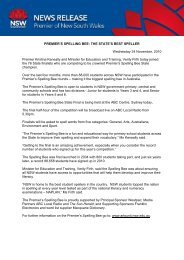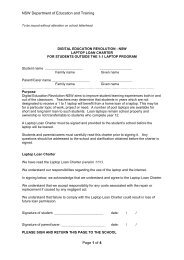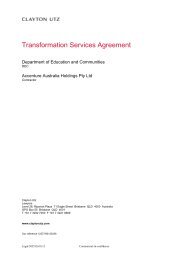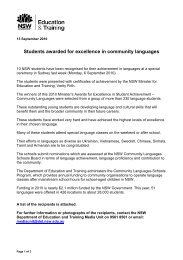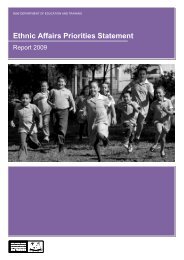NSW Department of Education and Training
NSW Department of Education and Training
NSW Department of Education and Training
Create successful ePaper yourself
Turn your PDF publications into a flip-book with our unique Google optimized e-Paper software.
Schools<br />
<br />
<br />
<br />
All regions were required to develop regional equity plans. All regions planned to provide<br />
pr<strong>of</strong>essional learning, support <strong>and</strong> advice to schools in implementing a range <strong>of</strong> programs<br />
<strong>and</strong> initiatives aimed at improving the outcomes for students from diverse cultural <strong>and</strong><br />
linguistic backgrounds.<br />
An Equity Programs <strong>and</strong> Distance <strong>Education</strong> Regional Initiatives Support Document was<br />
provided to regions. It incorporated information <strong>and</strong> guidance to assist regions in planning<br />
<strong>and</strong> reporting on multicultural education <strong>and</strong> ethnic affairs initiatives for schools, including<br />
the mapping <strong>of</strong> initiatives against the <strong>NSW</strong> State Plan.<br />
South Western Sydney Region distributed an accountability framework to support<br />
schools in their planning <strong>and</strong> reporting on implementation <strong>of</strong> the Anti-Racism Policy <strong>and</strong><br />
Cultural Diversity <strong>and</strong> Community Relations Policy: Multicultural education in schools.<br />
TAFE <strong>NSW</strong><br />
<br />
<br />
The TAFE Equity Committee continued to provide advice to the TAFE Executive Group in<br />
relation to the implementation <strong>of</strong> policies <strong>and</strong> strategies for students from equity groups,<br />
including those from a non-English speaking background.<br />
TAFE Strategy Directorate provided policy, planning <strong>and</strong> performance advice to senior<br />
TAFE <strong>NSW</strong> management to better position TAFE <strong>NSW</strong> to meet national <strong>and</strong> state VET<br />
priorities for learners from a non-English speaking background <strong>and</strong> to address the needs<br />
<strong>of</strong> migrants <strong>and</strong> refugees settling in New South Wales. For example, advice developed<br />
by the TAFE <strong>NSW</strong> Multicultural <strong>Education</strong> Unit was provided to TAFE <strong>NSW</strong> Institutes on<br />
migration <strong>and</strong> settlement patterns, including to regional New South Wales.<br />
Community <strong>and</strong> Migrant <strong>Education</strong><br />
<br />
Adult Migrant <strong>Education</strong> Service (AMES) provision is monitored <strong>and</strong> strategies adjusted<br />
by management committees in each region.<br />
1.2 DATA COLLECTION AND RESEARCH<br />
Schools<br />
The cultural <strong>and</strong> linguistic diversity <strong>of</strong> New South Wales is reflected in its schools. Data<br />
collection <strong>and</strong> research initiatives assist in the identification <strong>of</strong> multicultural education <strong>and</strong><br />
training outcomes <strong>and</strong> priorities <strong>of</strong> the <strong>Department</strong>.<br />
Table 1<br />
2005 – 2008 Enrolment data <strong>of</strong> students from language backgrounds<br />
other than English in <strong>NSW</strong> government schools<br />
Year<br />
Schools<br />
LBOTE student numbers LBOTE students %<br />
2005 203,378 27.0%<br />
2006 206,296 27.4%<br />
2007 207,031 27.6%<br />
2008 212,529 28.4%<br />
4


